Truth, reconciliation & entrepreneurship: Amplifying the voices of Indigenous founders
In September, communities across Canada mark National Day for Truth and Reconciliation. It is a time to reflect on and learn from a difficult history and take action to advance reconciliation. At Futurpreneur, we proudly support the Truth and Reconciliation Commission of Canada’s Call-to-Action #92, focusing on Indigenous economic empowerment.
We believe entrepreneurship is a transformative tool for Indigenous self-determination and economic reconciliation, fostering growth and prosperity. The Indigenous Entrepreneur Startup Program (IESP) was created to support young Indigenous entrepreneurs as they build businesses that reflect their values and contribute to thriving communities.
To better understand the role of entrepreneurship in advancing reconciliation, we spoke with three young Indigenous entrepreneurs supported by Futurpreneur. We asked them to share their personal and professional journeys and how their businesses are contributing to a stronger future for their communities.
Finding purpose and pride in entrepreneurship
Branden Bruyere, who is from Biigtigong Nishnaabeg (in Northwestern Ontario), is the founder of Giniw Printing Co., a side business he runs alongside his full-time work with the Pic River Development Corporation. He started his business after recognizing a gap for local printing services in his community.
“I had a vision for my business, but I needed support to make it a reality,” Branden says. “Futurpreneur’s loan financing gave me the capital I needed, and the mentorship has been a huge resource when challenges come up.”
Giniw Printing Co. has already grown beyond Branden’s expectations, and he takes great pride in serving local First Nation bands and businesses, as well as nearby Pukaskwa National Park. His dream is to grow the business to a full-time operation that provides employment and opportunities for his community.
For Branden, truth and reconciliation means moving forward together to build lasting, respectful relationships between Indigenous and non-Indigenous communities. It is about honouring the struggles of ancestors while also walking with pride today.
“I have seen how important it is to work side by side and support one another, and I want to continue growing those lasting relationships in both business and community,” he says. “It means sharing traditions and celebrating each other’s successes. Friendship grows when we cheer for one another.”
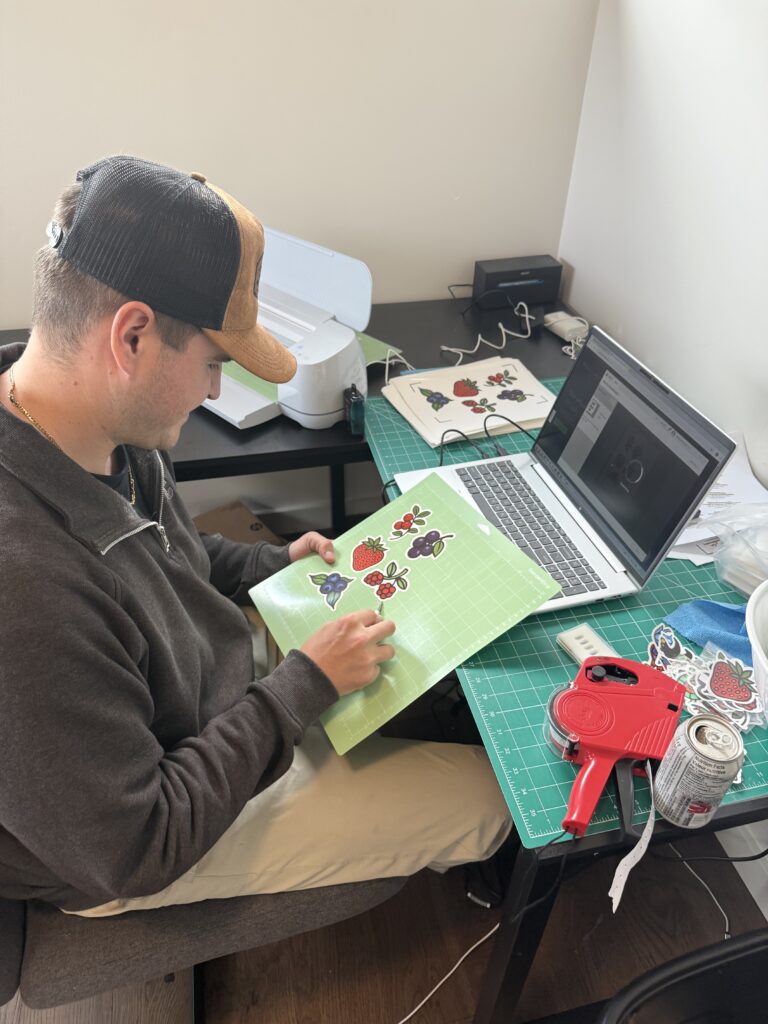
From a personal journey to a mission to empower
Jacinda Belisle, an Ojibwe woman with ancestry from Batchewana First Nation in Northern Ontario, is the founder of Lilies Pages, a planner and stationery brand. The business was born during a financially and emotionally difficult time in her life.
“Everything pointed back to planning, but I couldn’t find the right tools to organize my thoughts, goals and next steps,” Jacinda says. “What started as a personal need became a business that helps others find clarity and purpose through beautifully designed planners and tools.”
For Jacinda, truth and reconciliation is deeply personal. She reflects on what her grandmother, a residential school survivor, endured, and the “what ifs” of a culture lost to shame.
“Truth and reconciliation means acknowledging those painful truths and working toward healing and restoration,” she says. “While Lilies Pages is not inspired by Indigenous women specifically, it is built on the belief that every person has a story worth telling. In that way, it contributes to reconciliation by helping people reconnect with themselves and their values, including cultural identity when that’s part of their journey.”
Jacinda wants to share a message of empowerment with other Indigenous entrepreneurs. “Your story matters. Your voice is powerful. You don’t need to fit a mold — your path is valid, and your culture is a strength.”

Healing intergenerational trauma through business
Dr. Sadie Laronde is an Anishinaabe Ojibwekwe from Teme-Augama First Nation. She is the founder of The Effect Healing Collective, a trauma-informed healing centre in Ottawa. Her vision is to decolonize healthcare by blending chiropractic care with a wholistic, Indigenous worldview.
“I recognized the limitations of conventional, extractive healthcare models,” she says. “Inspired by my own healing journey and cultural teachings, I launched The Effect Healing Collective to bring accessible, collaborative and culturally grounded care to my community.”
For Sadie, truth and reconciliation is a path to reconnecting with our collective humanity. In her business, it shows up as creating a decolonized healthcare model, centering values of equity, community and cultural safety. She encourages Indigenous youth to see their cultural knowledge as strength.
“Entrepreneurship has the power to advance truth and reconciliation by demonstrating Indigenous ways of doing business, ways that are grounded in respect, reciprocity and sustainability,” Sadie says. “My hope is that others see entrepreneurship not only as a path for personal success, but also as a way to repair relationships, build generational wealth and strengthen our communities for the future.”

Entrepreneurship as an act of reconciliation
Futurpreneur is honoured to walk alongside entrepreneurs like Branden, Jacinda and Sadie. Their stories illustrate the power of entrepreneurship as a tool for self-determination and economic reconciliation.
Holly Atjecoutay, Futurpreneur’s Head of Inclusive Impact and Director of Indigenous and Northern Entrepreneurs, reflects on this deeply personal connection. “Historically, Indigenous economies were egalitarian, independent and flourishing, akin to modern-day entrepreneurship,” she says. “These ways were lost with colonialism. Indigenous Peoples possess a blood memory of entrepreneurship; it comes naturally to so many Indigenous youth.”
“At the foundation of Indigenous economic prosperity and reconciliation is entrepreneurship. We are witnessing the revitalization of Indigenous economies, reclaiming our sovereignty and space within the broader Canadian economy. Our all-Indigenous team works alongside young Indigenous entrepreneurs, building tailored programs and connecting them to valuable resources and supports.”
Starting your business journey
The stories of these entrepreneurs show that businesses are more than a service or product. They are a reflection of culture, resilience and hope.
The Indigenous Entrepreneur Startup Program (IESP) provides start-up loan financing and up to two years of mentorship, supported by an Indigenous team, offering access to tools and networking.
If you are an Indigenous entrepreneur, ages 18-39, anywhere in Canada interested in starting, buying or growing a business, you can learn more about a loan with mentorship and resources from the Futurpreneur Indigenous Entrepreneur Startup Program. Click here to learn more.
Sustainable fashion finds a new home in Corner Brook: Futurpreneur Roshayne Mendis’s success story
At the forefront of sustainable fashion, Contour Clothing Boutique is the first North American brand to offer complete end-to-end transparency in its design and production process. Founded and designed in Newfoundland and Labrador, Contour is redefining what it means to dress with purpose—meticulously curating upcycled fabrics, collaborating closely with ethical offshore manufacturers, and prioritizing environmental responsibility at every stage. We sat down with founder Roshayne Mendis to explore the vision, values, and journey behind the brand that’s making eco-conscious fashion both stylish and meaningful.
1. Please tell us about yourself and your experience as a newcomer entrepreneur in Canada.
My name is Roshayne Mendis, founder and creative force behind Contour Clothing Boutique in Corner Brook, Newfoundland & Labrador (NL). My journey to Canada began in 2018, when I arrived to pursue a master’s degree; today, I’m proudly advancing my academic career with a PhD at Memorial University’s Grenfell Campus. Alongside my academic and entrepreneurial journey, I’m also the proud mother of a spirited and joyful 3-year-old who brings laughter into my everyday life. I love being an entrepreneur, a mother, and a lifelong creator.
2. Please tell us about your business, its origin story, your mission and vision.
Before moving to Canada, I spent over seven years in the apparel manufacturing industry, working as a Designer and Product Development Manager. After settling into my new life, I began exploring ways to reconnect with my creative roots and apply my industry experience—all while navigating the early stages of motherhood. Although the pandemic brought unexpected challenges and delays, it also offered a rare pause, allowing me the space to reflect, and ultimately reignite my passion for fashion and purposeful design.
Contour Clothing was born out of a desire to create sustainable, versatile fashion that aligns with my values: sustainability and eco-conscious fashion. My brand focuses on timeless pieces that can be styled in multiple ways and worn for different occasions—from office wear to dinner—embracing the concept of “Desk to Dinner.” I want people to rethink how they shop for clothing by choosing pieces that offer both value and versatility.
One of the biggest challenges I faced when starting my business was the high cost of importing fabric, due to the limited number of textile manufacturers in Canada. I was fortunate to receive early support through a loan from Futurpreneur and a Women’s Enterprise Organizations of Canada (WEOC) loan from Newfoundland and Labrador Organization of Women Entrepreneurs (NLOWE), which helped me lay the foundation for Contour Clothing.
Another significant hurdle for newcomer entrepreneurs is building a professional network. While I have a strong support system in Sri Lanka, establishing brand recognition in Canada takes time, persistence, and consistent outreach. As a newcomer, it can also be difficult to gain trust—many are hesitant to collaborate with or invest in unfamiliar brands. Despite these obstacles, I remain committed to growing a community that uplifts women and empowers newcomer entrepreneurs across Newfoundland and Labrador.
3. What inspired you to start your own business in Canada?
Driven by a deep passion for textiles and product development, I felt a strong calling to apply my knowledge and experience in a meaningful way. I recognized a clear gap in the market for sustainable designer wear that blends elegance with everyday practicality—and that insight became the catalyst for launching my own brand. I wanted to create clothing that not only looks beautiful but also aligns with conscious living and modern lifestyles.
4. What are some of your biggest wins since launching your business?
One of my proudest moments was launching my store with the support of The Shop, Salt. Emily and Lauren have been incredibly encouraging, especially toward new entrepreneurs. I’ve also collaborated with local businesses such as Sea Salt and Twig and JR Fashion Designs to feature their jewelry and fashion in my store. I strongly believe in supporting fellow designers and makers in any way I can.
But above all, my greatest achievement has been the connections I’ve built with my customers. The long, heartfelt conversations and their ongoing support remind me every day why I do what I do.
5. How did Futurpreneur support your entrepreneurial journey?
Starting a retail business is costly, especially when setting up a physical store. I needed fixtures, lighting, renovations, and initial stock to launch successfully. The $25,000 loan I received from Futurpreneur helped me convert my online store into a brick-and-mortar location. It was a major stepping stone and an absolute blessing.
6. What advice would you offer to newcomer entrepreneurs starting their businesses in Canada?
If you have a great idea, believe in it and start. It may or may not work out, but failure is never final, it’s just part of the journey. Each step helps you gain experience and grow. Reach out to fellow entrepreneurs in your community and be open to partnerships. Especially in places like Newfoundland and Labrador, we need stronger entrepreneurial networks that uplift and support one another. I also work as a startup advisor for NLOWE, a great organization that supports women entrepreneurs.
7. What’s the most important thing you’ve learned about yourself as an entrepreneur?
The journey is tough, but resilience is everything. I’ve come to understand the power of perseverance and confidence. I have a toddler at home who looks up to me, and every day I remind myself that I’m showing him how to dream big, work hard, and never give up.
If you are a newcomer entrepreneur like Roshayne, click here to learn more about Futurpreneur’s My Canadian Startup program presented by TD Bank.
Igniting ambition: How Futurpreneur’s Women in Entrepreneurship Initiative is empowering young women founders across Canada
Everywhere in Canada, young women are turning their ideas into businesses that change lives. Whether it’s a new product designed at the kitchen table or a bold service launched in their community, women entrepreneurs are building a stronger future for Canada. Yet, too many face barriers, not by lack of talent or ambition, but because of systemic challenges that hold them back.
Research from the Canadian Chamber of Commerce highlights a higher-than-average share of “missing women entrepreneurs”—women who could be contributing to the economy if not for gender-based and intersectional barriers. The estimated loss of 710,000 women entrepreneurs over the past decade represents up to $180 billion in unrealized economic impact.
This is not just a social issue; it’s an economic opportunity. That’s where Futurpreneur comes in. With the support of TD, we’ve launched the Women in Entrepreneurship Initiative, a program designed to help women founders across Canada access the financing, mentorship and community they need to succeed.
Why supporting women entrepreneurs matters in Canada
The Women Entrepreneurship Knowledge Hub (WEKH) reports steady progress: in 2024, 19% of all businesses in Canada were majority-owned by women, up from 18.4% in 2023. It’s encouraging momentum, but far from enough.
Small and medium sized businesses make up 98% of all Canadian businesses. If more women could fully participate, imagine the growth, possibilities and inclusive prosperity that would follow. Supporting women entrepreneurs isn’t just the right thing to do, it the smart thing to do for Canada’s future.
Futurpreneur’s track record of impact
At Futurpreneur, we know what’s possible when women have the right support. In FY2025, 43% of the businesses we supported were women-led. That’s 2.4 times higher than the Canadian average.
This success shows what happens when barriers are removed and women are given access to financing, mentorship and resources. Thousands of women founders have launched businesses with Futurpreneur, creating jobs, strengthening communities and contributing to inclusive economic prosperity across Canada.
The Women in Entrepreneurship Initiative builds on this success, ensuring even more women have the tools, knowledge and confidence to thrive.
About Futurpreneur’s Women in Entrepreneurship Initiative
Officially launched in Toronto on Sept. 10, 2025, and presented by TD, the Women in Entrepreneurship Initiative is designed to help young women founders start and succeed. It complements Futurpreneur’s proven model of financing up to $75,000 paired with two years of mentorship and tailored programming built around three key pillars:
Networking events: Opportunities to connect with coaches, mentors, business leaders and fellow women entrepreneurs
Peer-supported communities: Safe, collaborative spaces to share experiences, insights and encouragement
Capacity-building workshops: Practical training on financial management, marketing, international expansion and raising capital.
This holistic approach ensures women entrepreneurs in Canada can build businesses with confidence and resilience.
A conversation with Mona-Lisa Prosper
To help us learn more about this exciting new program, we sat down with Mona-Lisa Prosper, Senior Director of Community Engagement at Futurpreneur.
Q: What is the purpose of Futurpreneur’s new Women in Entrepreneurship Initiative and why is it so important right now?
A: Women entrepreneurs are resilient and innovative, yet they still face barriers that men often don’t, whether it’s access to financing, mentorship or technology adoption. We know from research and our own experience that women, particularly those from diverse backgrounds, continue to encounter roadblocks to business success. By offering a dedicated program, we’re accelerating women’s success and addressing those gaps. When women thrive, communities thrive.
Q: What sets Futurpreneur apart in supporting women entrepreneurs?
A: Since 1996, Futurpreneur has helped more than 20,000 entrepreneurs across Canada start, buy and grow their businesses. Our impact with women entrepreneurs is especially significant: in FY2025, 43% of the businesses we supported were majority women-owned – 2.4x higher than the national average. That shows our approach works.
We’re also national, bilingual and deeply connected in communities coast to coast. Our long-standing partnerships with TD through the TD Ready Commitment has enabled us to offer programs like My Canadian Startup for newcomers. Together, with this Women in Entrepreneurship Initiative, we’re aiming to connect 1,500 women founders with the resources and communities they need to succeed.
Q: What is your vision for the future of women in entrepreneurship?
A: I want every woman with a business idea to know that she belongs here. This initiative is about equipping women not only to start or buy businesses, but to lead with confidence, create jobs and strengthen communities across Canada. I see a future where women’s entrepreneurship is not the exception but the expectation.
How to join the Women in Entrepreneurship Initiative
If you are woman between the ages of 18-39 with a business idea or even just a spark of one, Futurpreneur is here for you. With financing, mentorship, networking and workshops tailored to women, this initiative is designed to help you move from idea to action.
Learn more about the Futurpreneur Women in Entrepreneurship Initiative presented by TD and discover how Futurpreneur can help you launch and grow your business.
Frequently Asked Questions (FAQ)
Q: What support does Futurpreneur provide for women entrepreneurs?
A: Loan financing of up to $75,000, two years of one-to-one mentorship, plus networking, peer support, and workshops through the Women in Entrepreneurship Initiative.
Q: Who is eligible to apply?
A: Women entrepreneurs aged 18–39 across Canada who are starting, buying, or growing a business.
Q: How does Futurpreneur compare to national averages?
A: In FY2025, 43% of the businesses supported by Futurpreneur were women-led – 2.4x higher than the Canadian average of 19%.
Q: How do I get started?
A: Visit our home page to learn more about the process. Our team is here to support you, every step of the way.
Your time is now
Your idea matters. Your vision matters. And your time is now. Futurpreneur’s Women in Entrepreneurship Initiative, presented by TD, is here to help you take the first step. With mentorship, financing, and a community that believes in you, there has never been a better moment to start your entrepreneurial journey.
Join Futurpreneur’s Women in Entrepreneurship Initiative presented by TD, today, and turn your ambition into action.
Radiant ambitions: Oumar Bah’s journey to revolutionize skincare
For Oumar Bah, his entrepreneurship journey started early.
Growing up, he spent his time in two very different places—his mom’s pharmacy and his dad’s construction sites. One was about care and healing. The other was about building from the ground up. Together, those experiences shaped a big dream: to create his own line of skincare products.
“I always wanted to learn how to make skincare,” Oumar says. “Helping my mom in her pharmacy and watching her create solutions for skin problems really stuck with me. I knew I wanted to do something like that too.”
Today, that dream has taken shape through Cosmepharm, a Cowansville, Quebec-based family-run business that manufactures and distributes dermocosmetic products. Their signature line, Radiant Skin, stands out for its multitasking formulas. “Each product of our brand addresses multiple skin issues in a single product,” Oumar explains. The result? High-end skincare that remains accessible and affordable compared to competitors.
But even with strong products, Oumar knew there was a missing piece. “Our biggest hurdle was marketing,” Oumar explains. “We didn’t have the experience, and the costs can add up quickly. We also didn’t know how to use digital marketing to turn interest into sales.”
To tackle these challenges, Oumar joined the Futurpreneur DIY Marketing program, sponsored by Empower by GoDaddy.
The program included:
- Live expert-led training with marketing coach Fortune Ibare-Jones
- Flexible self-paced modules to fit busy entrepreneurial schedules
- A focus on tools like AI, SEO, and social media to grow online presence
- A $1,000 marketing grant to help put strategies into action
This flexible mix of live coaching and self-paced learning helped Oumar and other participants to build a marketing plan that truly fits their business’ needs.
“The program showed me how to refresh our branding across our website and social media. It also taught me how to use SEO keywords to stand out online.”
Oumar also discovered new ways to work smarter: “We learned how AI tools can make us more effective and boost productivity without breaking the budget.” With this fresh knowledge, he plans to use email marketing, retargeting, and online communities to convert more prospects into customers.
And he’s not doing it all alone. “We will entrust social media management to digital marketing specialists to make sure our message is clear and consistent.” Thanks to the $1,000 grant awarded after completing the program, Oumar is ready to put these new strategies into action.
Looking ahead, Oumar’s vision for Cosmepharm is both ambitious and grounded: “In the coming years, we want Cosmepharm to become a local and international reference in dermocosmetics—known for reputation, quality, solutions, and innovation.”
But it’s not just about business growth. Oumar is also passionate about giving back. “We want to help fund community organizations that support mental health and other causes like ADHD,” he shares.
To anyone just starting out, Oumar delivers this message: “Believe in yourself, empower yourself, and unleash the entrepreneur within. The entrepreneurial journey is full of ups and downs, but through the storms, you build yourself.”
Looking to start, buy or grow your business?
The Futurpreneur Black Entrepreneur Startup Program (BESP) could be your gateway. Along with financing and one-on-one support, you’ll also gain access to exclusive programs— like the DIY Marketing program, sponsored by Empower by GoDaddy that helped Oumar take his brand to the next level.
Learn more about how BESP can help bring your entrepreneurial vision to life today, here.
Launched with Pride: A Q&A with 2SLGBTQIA+ Futurpreneurs Jackie Toner and Christina Owczarek
Pride Season is a time to uplift and celebrate the voices, identities and contributions of 2SLGBTQIA+ communities — including the bold and brilliant entrepreneurs breaking barriers and building businesses on their own terms.
In Canada, 2SLGBTQIA+-owned businesses contribute an estimated $22 billion to the economy and employ more than 435,000 people. According to the Canadian Gay and Lesbian Chamber of Commerce, there are over 100,000 such businesses across the country. Yet despite their significant impact, these entrepreneurs continue to face barriers: less than 1% of venture capital funding goes to 2SLGBTQIA+ founders, and nearly half say they’ve felt the need to hide their identity in business settings.
At Futurpreneur, we proudly support diverse founders every day of the year. This Pride Season, we’re spotlighting two inspiring 2SLGBTQIA+ entrepreneurs who are building more inclusive spaces through passion and purpose:
Jackie Toner, Founder of The Woods(wo)man, is carving out space — literally and figuratively — for creativity, representation and inclusion in the traditionally male-dominated world of woodworking.
Christina Owczarek, founder of XhAle Brewery, believes in “making the world a better place one pint at a time.” Through her craft beer business, she’s brewing more than just world-class ales — she’s cultivating connection, community and celebration in every sense.
Read on as Jackie and Christina share their journeys as 2SLGBTQIA+ entrepreneurs, the inspiration behind their businesses and what Pride means to them.
What does Pride Season mean to you personally and professionally as an entrepreneur?
Jackie: Pride Season is a fine line. On one hand, it’s powerful to be seen and celebrated — but on the other, 2SLGBTQIA+ folks don’t stop existing the other eleven months of the year. Meaningful support means also showing up when it’s quiet. That said, I really listened to my community and realized I was missing something in my own offerings — representation. So, I launched a Pride Collection that reflects 2SLGBTQIA+ identities not just as a moment, but as something folks can carry with them year-round.
Christina: It’s Pride all year for us. It is a special month, but we do the work all year round. We are social ventures, loud advocates and intentionally take up space 12 months a year. We participate, support and work with other 2SLGBTQIA+ organizations, non-profits and businesses ongoing as part of our core values and community strengthening efforts. Unfortunately, we have also been pushed out of spaces during Pride because we can’t supply monetary transactions or support like other craft breweries who aren’t minority representation owned and run.
What have been some of the unique challenges or breakthroughs you’ve encountered as a 2SLGBTQIA+ entrepreneur?
Jackie: Running Woods(wo)man Woodworking as a 2SLGBTQIA+ entrepreneur has been both challenging and deeply affirming. In a male-dominated craft and rural setting, I’ve often felt like I was forging a path without a map. Visibility remains a barrier — especially for rural 2SLGBTQIA+ entrepreneurs, who are often excluded from urban-centred funding and community spaces. Still, building a business on my own terms has allowed me to create something different: a space where 2SLGBTQIA+ folks, women and marginalized makers aren’t just included — they’re centred. One of the most powerful moments is when someone walks into my booth and says, “I’ve never seen myself in this space before — until now.”
Christina: Being in Alberta comes with its own challenges — especially in today’s political climate, where progressive policies and openness to difference are being rolled back. Our company has been doxed online for being vocal advocates in our community. We’ve lost accounts, revenue and event partnerships for speaking out on harmful gender policies that directly affect us and our community. As 2SLGBTQIA+ entrepreneurs in STEM and craft brewing, we’re often doubted and have to work twice as hard to earn respect and recognition. And yet, we’ve built a loyal following of people who share our values.
What’s one moment of Pride (pun intended!) in your entrepreneurial journey that you’d love to share with us?
Jackie: One moment that continues to stick with me is the first time I ran my bowl-turning course specifically for women and gender-diverse individuals. The course was designed to be a welcoming, inclusive space — a direct response to the many folks who told me they had previously felt unwelcome, unsafe or out of place in traditional woodworking environments. One student said, “This is the first time I’ve felt like I belong in a shop space.” That moment reminded me exactly why I do this: not just to teach skills, but to help carve out spaces where people can show up fully as themselves and feel powerful doing it.
Christina: Probably when we collected our first Canadian Brewing Award in Vancouver. A longtime industry peer quietly acknowledged that not only was this a big a deal to get an award, but the fact that we’ve done it when the world constantly pushes back on you being who we are what we do is even bigger. He saw me, and us in that moment with absolute vulnerability that it brought me to tears.
How has Futurpreneur supported you on your entrepreneurial journey?
Jackie: Futurpreneur gave me the tools to turn my vision into something tangible. With the financial support they provided, I was able to scale my business to a point where I could hire and collaborate with other women and 2SLGBTQIA+ folks. That was a pivotal shift — not just building something for myself, but creating opportunities for others in my community. In a market that often feels divided or exclusionary, it meant everything to be able to grow a business that could hold space for shared values, inclusivity and dignity.
Christina: Honestly, when I received my Futurpreneur loan, there was no diversity programming in place. As a new Canadian, single, 2SLGBTQIA+ woman who lost her job due to COVID, I qualified for the bare minimum — lacking collateral, credit history or a guarantor, despite having over a decade of experience. It’s been encouraging to see Futurpreneur open the annual accelerator to more than just top performers — recognizing that access to capital and lived experience matter.
Ready to launch or grow your business? Futurpreneur supports young entrepreneurs from many diverse communities across Canada. Learn more about Futurpreneur’s flexible, equity-free loan with mentorship and resources here.
Built in Vancouver: Young, ambitious and changing the game
Vancouver stands out as a vibrant hub for entrepreneurship in Canada.
According to the City of Vancouver, approximately 80,000 businesses call Vancouver home, with a remarkable 98% classified as small businesses (employing fewer than 50 people). A significant 54% are self-employed individuals, while the remaining 46% have one or more employees. While small businesses are the predominant type, the majority of employees in Vancouver work for larger companies. However, StartUp Blink ranks Vancouver second in Canada for startup growth, just behind Toronto.
Each May, Vancouver Startup Week celebrates this dynamic ecosystem. Let’s shine a light on three inspiring Vancouver-based businesses supported by Futurpreneur, each demonstrating the innovation and drive that define the city’s entrepreneurial spirit.
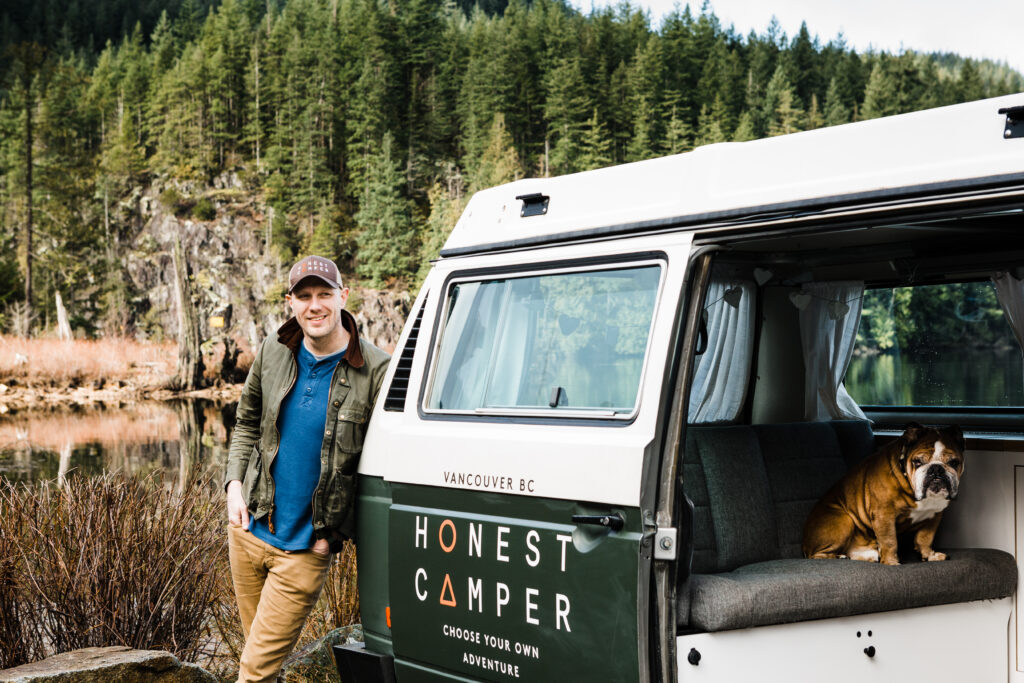
Honest Camper
Futurpreneur: William Jarvis
Product: Fully-equipped rental vans
Website: https://www.honestcamper.com/
Honest Camper offers premium, fully equipped camping van rentals for those eager to explore the stunning Pacific Coast and interior. Inspired by a memorable road trip, founder William Jarvis wanted to share the experience of connecting with nature. Operating from Coquitlam, BC, Honest Camper also has a presence in San Francisco, ensuring year-round business. They provide an opportunity to escape the everyday and embrace the freedom of the open road.

Risa Vancouver
Futurpreneurs: Rid and Sal Sayyal
Product: Upcycled handbags
Website: https://risavancouver.com/
Risa Vancouver is a family-owned business crafting beautiful bags from upcycled leather. Led by two sisters, Rid and Sal Sayyal, they are committed to sustainability and ethical production, partnering with women artisans in India. Their mission is to blend affordable luxury with environmental responsibility, creating stylish, high-quality bags that contribute to a cleaner planet, one bag at a time.

Double Sunrise
Futurpreneur: Stephanie Baker
Product: Women’s clothing
Website: https://www.doublesunrise.ca/
Double Sunrise is a women’s clothing brand born from a desire for empowering apparel. Founded by Stephanie Baker in 2020, their collections draw inspiration from tropical getaways and timeless designs, offering pieces that evoke a resort-wear feel. With a focus on mindful fabric choices and smaller production runs in Vancouver, Double Sunrise champions both style and sustainability.
At Futurpreneur, we’re proud to support the energy and vision of young entrepreneurs who are not only building innovative businesses but also strengthening the fabric of communities across British Columbia and the entire country.
Ready to build your own future? Futurpreneur offers startup loan financing with mentorship and resources to help young entrepreneurs across Canada start, buy or grow their businesses. Learn more about us.
Are you a Futurpreneur-supported entrepreneur? Want to showcase your products or services in our Futurpreneur Marketplace? Submit a quick application here to be featured on our year-round platform.
From sustainability to scalability: How Futurpreneur’s Growth Accelerator program is helping young entrepreneurs rethink their supply chains and sales strategies
When you’re growing a business, you can feel like you’re juggling a dozen tasks at once.
The Futurpreneur Growth Accelerator program, presented by Spin Master, Lexus Canada, and supported by National Bank, is designed to help young entrepreneurs like you sharpen your skills and tackle key challenges, from supply chain management to sales strategies. This program is about more than just growth—it’s about building a smarter, more efficient business.
Whether you’re learning how to streamline your supply chain, create a scalable sales strategy, or build meaningful connections, the Growth Accelerator helps you move forward. Let’s look at how four young entrepreneurs have already used the program to refine their businesses and push their ideas further.
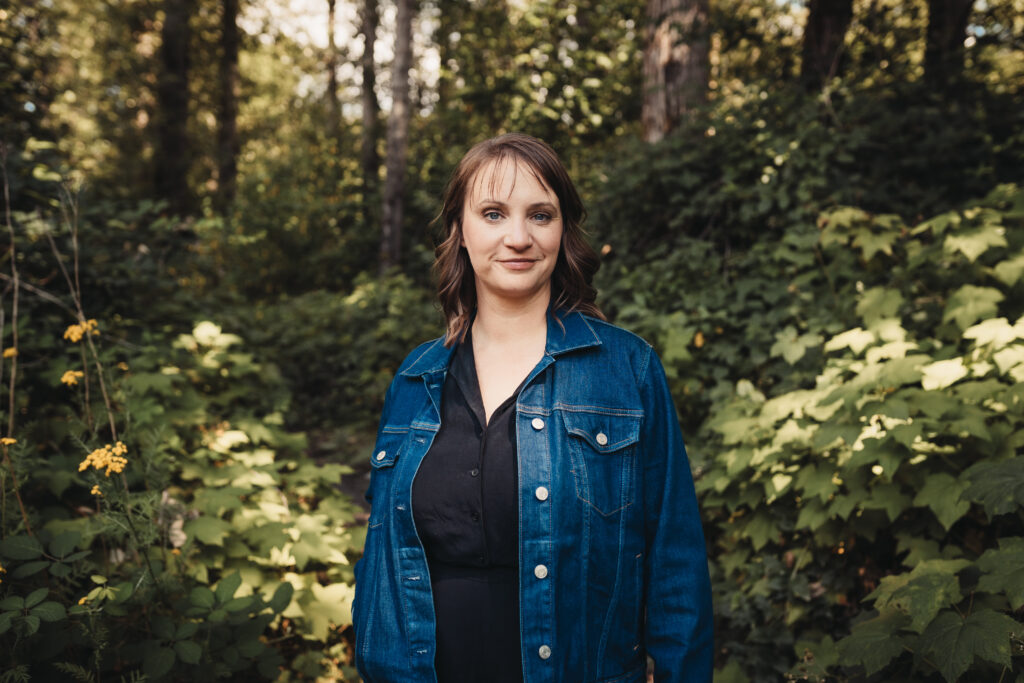
Maria Olson: Building a values-driven supply chain
Maria Olson, founder of Fox & Thistle Mercantile in Chilliwack, BC, knows that sustainability isn’t just a trend—it’s a necessity. “I’ve faced challenges with finding packaging that is affordable, Canadian-made, and available in small quantities,” Maria explains. “It’s not just about cost—it’s about ethics, carbon footprint and space.”
Through the Growth Accelerator, Maria realized the importance of forecasting and inventory management. She’s now making smarter decisions on purchasing and planning, and is focused on finding more sustainable packaging solutions that reflect her values.

Usman Uzzi Sultoni: Aligning growth with operational efficiency
Usman Uzzi Sultoni, founder of Adventure Outdoors in Abbotsford, BC, faced a different challenge: operational consistency. “The biggest issue was dealing with delays from manufacturers and having too much stock of some products while running out of others,” Usman says. “That affects customer experience and cash flow.”
Through the Growth Accelerator, Usman learned to streamline his operations by focusing on supplier relationships, regular inventory counts and centralizing his systems. He’s now well on his way to a more organized and efficient business.
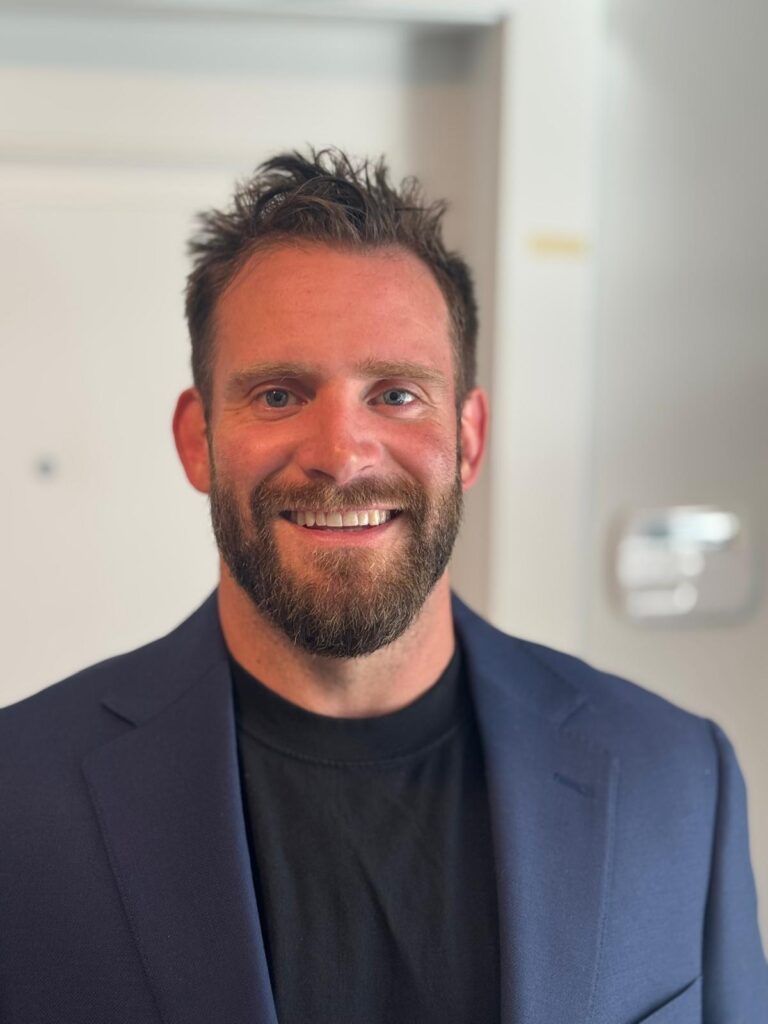
Grant Guenkel: Turning events into opportunities
Grant Guenkel, who runs Mister G’s Cookhouse Corp. in Southampton, ON, turned his mobile BBQ catering business into a year-round operation. “I realized I needed to think beyond the product. It’s about creating an experience,” he says. Grant has now started partnering with local businesses for joint events to build a stronger presence, even during the off-season.
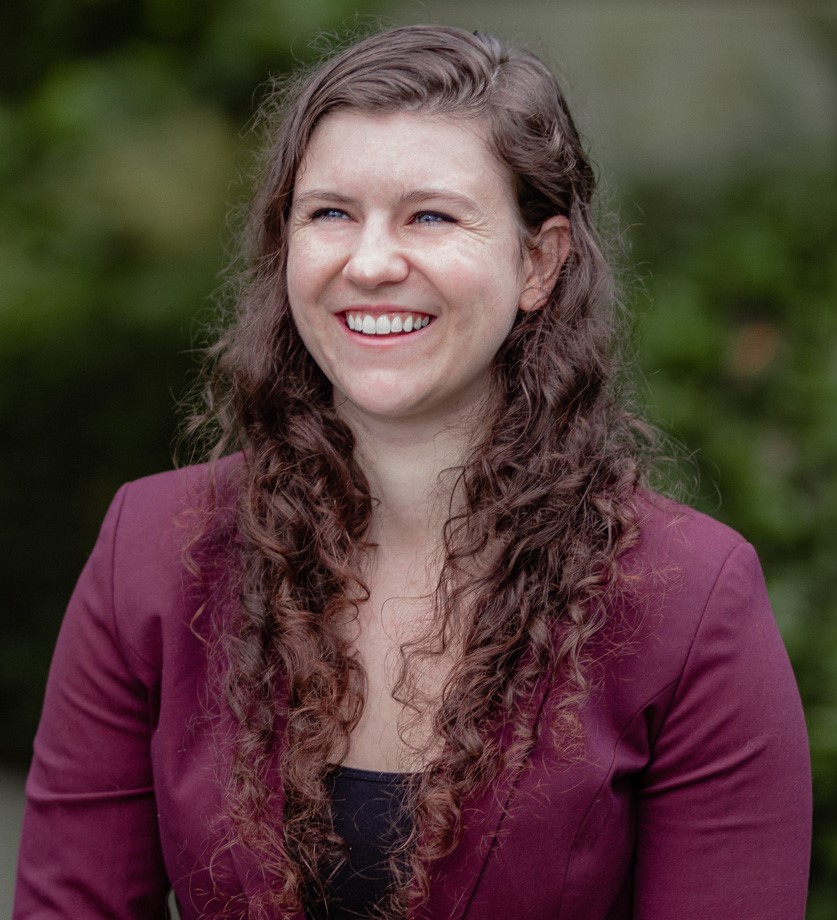
Christina Morrow: From organic growth to strategic selling
Christina Morrow, founder of Wicked Rose in Vancouver, BC, used to rely on organic growth through Instagram. But the Growth Accelerator Sales workshop showed her how to make the leap to wholesale. “Before, things felt scattered and not intentional,” Christina explains. With new strategies for outreach, prospecting, and lead generation, Christina is now building a more structured sales process.
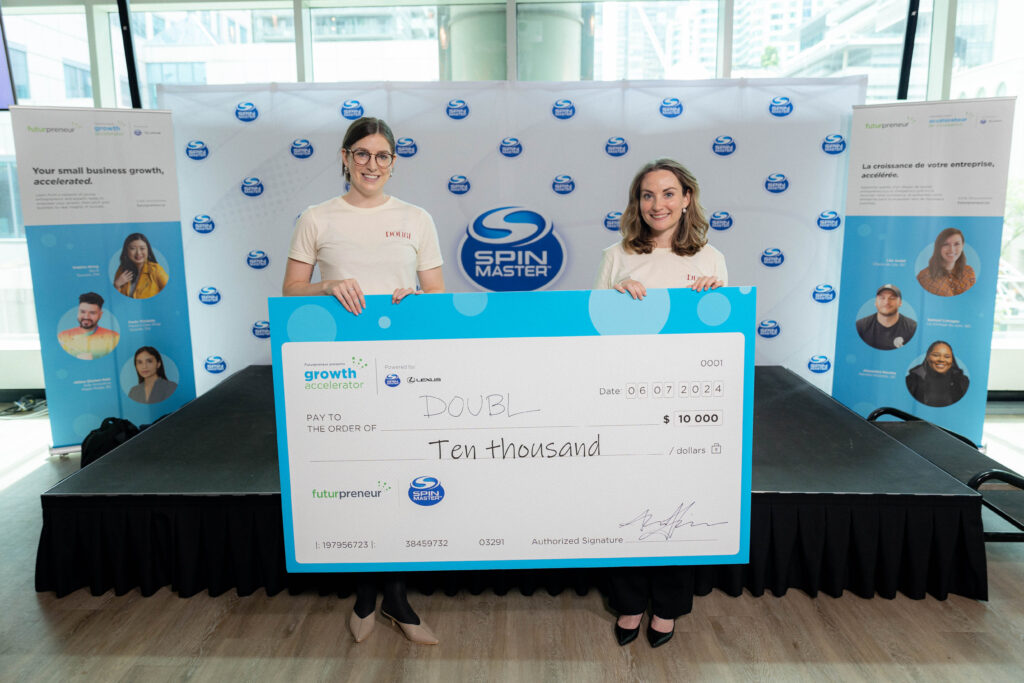
2024 winners: DOUBL
The 2024 Growth Accelerator pitch competition saw DOUBL, founded by Jessica Bosman and Bryn Davis Williams from British Columbia, win the top prize. Their innovative approach to sustainable fashion, using AI to create made-to-measure bras, exemplifies the entrepreneurial spirit the Growth Accelerator nurtures.
Their success is a testament to how the Growth Accelerator program helps entrepreneurs turn their innovative ideas into successful businesses.
Ready to take your business to the next level?
The Growth Accelerator is your opportunity to gain the tools, mentorship, and resources to grow your business. Whether you’re refining your supply chain or scaling your sales, this program is the key to moving forward.
If you’re interested in learning more about the program, check out Futurpreneur’s Growth Accelerator page.
If you’re ready to take the next step in your entrepreneurial journey, learn more about Futurpreneur’s loan with mentorship.
Earth Day, every day: How shopping local supports sustainability and entrepreneurs in Canada
Every day is a great day to make eco-conscious choices. For young entrepreneurs, it’s an opportunity to grow their businesses sustainably, contributing to a healthier planet while also helping their communities. At Futurpreneur, we’re excited to highlight a few of the many young entrepreneurs who are helping shape a sustainable future through their innovative products. By supporting local businesses, we’re not just investing in entrepreneurs’ dreams—we’re also making a positive impact on the environment.
Sustainable shopping trends
According to recent data from Agriculture and Agri-Food Canada, half of Canadian consumers say they’re buying more sustainable products than five years ago. Eight in 10 Canadians value a sustainable lifestyle, and 65% feel they have a moral obligation to use environmentally friendly products. As we face the realities of climate change, 6 in 10 Canadians report that it’s their top concern.
Supporting sustainable products is not just good for the planet—it’s good business. The Canadian sustainable market is valued at approximately $25 billion, according to Statistics Canada. This shows that sustainability is more than a trend—it’s a significant industry with immense potential for growth.
Here are a few Futurpreneur-supported businesses from the Futurpreneur Marketplace offering local, sustainable options for eco-conscious shoppers:

Gleam & Glow
Product: Skin cream
Futurpreneur: Camilia Destteffano
Website: gleamandglow.ca
Gleam & Glow is a skincare brand focused on natural, plant-based ingredients that are organic, cruelty-free, and packaged in recyclable materials. This brand is not just about skincare—it’s about a holistic approach to wellness, encouraging healthy thoughts and emotions along with healthy skin.

Pinky Swear & Co.
Product: Scented candles
Futurpreneur: Alexander Farrow
Website: pinkyswearandco.com
Pinky Swear & Co. creates clean-burning, long-lasting candles from sustainably sourced coconut soy wax. Their products are phthalate- and paraben-free, and they collaborate with Canadian markets and charities to give back to their communities.

Cooks Who Feed
Product: Chef-designed aprons
Futurpreneur: Seema Sanghavi
Website: cookswhofeed.com
Cooks Who Feed is on a mission to fight food insecurity with fair trade, organic aprons. Made by marginalized women in India, every purchase helps provide meals to those in need. This business is all about creating a sustainable impact through small actions.

Origine en Vrac
Service: Sustainable grocery store
Futurpreneur: Jean-Philippe Miville-Deschênes
Website: origine-vrac.ca
Origine en Vrac is a zero-waste grocery store in Quebec, focusing on reducing single-use packaging. Customers bring their own containers to fill with organic, fair trade, vegan, and eco-friendly products, making it easy to shop sustainably.
At Futurpreneur, we are proud to support young entrepreneurs who are committed to making the world a better place through sustainable business practices. We’re here to help them turn their eco-conscious ideas into thriving businesses.
Interested in learning more?
Find out how Futurpreneur’s loan with mentorship can help you start and grow your sustainable business by visiting Futurpreneur’s startup resources.
Are you a Futurpreneur-supported entrepreneur?
Would you like to feature your products or services in the Futurpreneur Marketplace? You can fill out a short application here.
Looking to shop sustainably?
Check out the Futurpreneur Marketplace to discover more eco-friendly products and services from Canadian entrepreneurs.
Buying strength, building success: Kirsten Burns’ path to business ownership with #OwnersWanted
When Kirsten Burns took the leap from manager to owner of Tri Fit Training in Airdrie, Alberta, she stepped into a new phase of her career with confidence and purpose—supported in part by Futurpreneur’s #OwnersWanted Program.
Tri Fit is a performance-focused facility offering strength and conditioning, nutrition services and massage therapy. After managing the business for five years, Kirsten officially purchased it in October 2024. For her, it wasn’t a dream years in the making—but rather the right opportunity at the right time.
From opportunity to ownership
“Business ownership wasn’t on my radar,” says Kirsten. “But after years of helping grow the business on the management side, I saw a chance to make a bigger impact.”
That chance came when the former owners offered her the opportunity to take over. Kirsten was already embedded in the business and had a deep understanding of its culture, clients and potential.
Why buying a business made sense
Rather than building from scratch, Kirsten saw the value in buying a business with an existing customer base, operations and strong community presence. It wasn’t without challenges—especially when it came to understanding finances and navigating the legal side of a share purchase.
But she wasn’t alone. From the early stages of her journey, Kirsten connected with Futurpreneur through a referral from RBC’s small business team.
Tools for confident ownership
Futurpreneur supported Kirsten with startup loan financing, a mentor and access to practical tools and resources. These supports helped her fine-tune her business plan, build scalable systems and overcome early uncertainty around revenue.
Mentorship proved especially valuable. Kirsten’s mentor helped her strengthen her social media strategy and refine how she markets within her local community.
“Identifying my strengths and weaknesses early on helped drive our conversations,” she says. “My mentor’s background in marketing helped me build confidence in areas that didn’t come naturally.”
Listen to Kirsten’s top success strategies for buying a business in this audio clip.
Alberta challenges and community strengths
Running a business in Alberta brings unique considerations—from market volatility linked to the oil and gas sector to challenges in attracting top talent. But it also presents opportunities.
“There’s a strong entrepreneurial spirit here,” says Kirsten. “And Airdrie, while growing fast, still has a small-town feel. The local support for small businesses is incredible.”
Her advice for navigating these complexities? Stay informed and surround yourself with experienced professionals who can help guide your decisions.
Lessons from experience
Kirsten’s journey hasn’t been without hurdles. Two key ones were assessing the financial health of the business and navigating the legal complexity of a share purchase.
Thankfully, she leaned on her network of fellow entrepreneurs, as well as a skilled accountant and lawyer, to feel confident she was making the right move.
She also emphasizes the importance of having a clear transition plan. Working collaboratively with the former owners helped retain staff and maintain trust with clients.
Common pitfalls to avoid
From her experience and conversations with mentors and peers, Kirsten highlights several common mistakes young entrepreneurs should avoid:
- Underestimating the time commitment required to run a business.
- Overlooking the importance of a smooth transition with staff and clients.
- Ignoring the need to manage cash flow, especially in the early days.
A new chapter, professionally and personally
Owning Tri Fit has given Kirsten more autonomy over her career but has also come with its demands. Wearing many hats has helped her grow in areas like leadership, problem-solving and decision-making.
“Being a business owner means rapid development in so many areas,” she says. “It’s been challenging—but incredibly rewarding.”
Thinking of buying a business? Here’s where to start
Kirsten encourages aspiring entrepreneurs to explore Futurpreneur’s #OwnersWanted program for insights, tools and real-world strategies to make business ownership a reality.
You can also learn more about Futurpreneur’s Startup Program, which offers startup loan financing with mentorship and resources—up to $75,000—here.
Want to learn more? Explore how #OwnersWanted helps young entrepreneurs on their journeys to purchase existing businesses in Canada.
Thank you to the Government of Alberta for supporting this initiative.
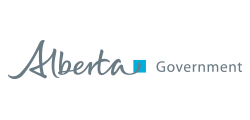
Celebrating four years of supporting Black entrepreneurs
In March 2021, the Futurpreneur Black Entrepreneur Startup Program (BESP), funded by RBC, launched with a clear mission: to provide Black entrepreneurs across Canada with access to the capital, mentorship, resources and networks they need to succeed.
Since then, the impact speaks for itself:
- $20.5 million in loan financing and follow-on loan financing disbursed;
- 511 Black-owned businesses supported; and
- 50% of supported Black-owned businesses are women-led.
These numbers tell part of the story, but for me, BESP’s impact is personal.
Why this work matters to me
Like many Black professionals, I spent years in corporate spaces as the only Black woman in the room. I mastered code-switching, learned how to shape-shift to fit in, but the higher I climbed, the more disconnected I felt from my purpose.
In 2017, I walked away from corporate and started consulting. A lot of my time went to Black non-profits and grassroots organizations. I wanted to contribute to a community that was too often overlooked and underfunded.
Then BESP found me.
A friend sent me a job posting at Futurpreneur in 2022. I applied, thinking, “Why not?” But the more I engaged with the organization, the more I saw something rare: real commitment to diversity, not just in words but in action. A Head of DEI at the senior leadership level? In a climate where companies are quietly backing away from diversity efforts, that means something.
When the opportunity to lead BESP came, I took another leap. And it changed everything.
A program that’s reshaping the economic landscape
Let’s be real, Black entrepreneurs face systemic barriers that make success harder. Limited access to capital, a lack of mentorship, and fewer industry connections make it tougher to scale a business. According to BDC, 84% of Black entrepreneurs are the first in their immediate or extended family to own a business, a rate higher than their non-Black peers.1 Despite these challenges, community support is strong, with 95% of Black business owners having previously supported another Black-owned business.
That’s why BESP isn’t just about financing; it’s about shifting the landscape entirely.
We’re not just investing in Black businesses. We’re investing in Black entrepreneurs—their ideas, their resilience, their ability to innovate and lead.
Take David Owasi, for example. He built Outreach Genius, an AI-driven marketing company in Winnipeg. In just 18 months, his team expanded tenfold, proving that Black tech founders are leading innovation in unexpected places.
Or Jayrell Diggs, who turned his frustration with juggling laundry and school into SudDrop, a Halifax-based fast-growing laundry service that’s now expanding beyond Nova Scotia. After winning a $10,000 Rock My Business Start-Up Award prize, he’s using his prize money to scale even further.
Beyond loans: The power of mentorship & community
Money is one thing. But access to mentorship, resources and networks? That’s where the real magic happens.
One of the most powerful aspects of BESP is that we’re not just handing out loans; we’re creating real connections. Having a mentor who understands your reality, who’s navigated the same barriers, changes everything. Because when you see someone who looks like you win, you realize you can win too.
Through financial literacy workshops, business planning support, and peer-to-peer connections, we’re making sure Black entrepreneurs don’t just launch their businesses; they successfully sustain and scale them.
Looking ahead: Expanding our reach
None of this would be possible without RBC. As BESP’s founding partner and biggest champion, RBC has been instrumental in turning a vision into reality. Their commitment to Black entrepreneurship isn’t just a pledge; it’s a game-changer. Thanks to their support, and additional loan financing from BDC, we’re reaching more Black entrepreneurs and helping them turn bold ideas into thriving businesses.
That means:
- Expanding beyond major urban centers: because Black entrepreneurs exist everywhere, not just in big cities;
- Strengthening post-disbursement support: with more marketing and financial workshops so that businesses can thrive after accessing their loans; and
- Building more networking opportunities: because sometimes, the best business advice comes from another entrepreneur who’s been in your shoes.
The work doesn’t stop here. We’re just getting started.
This is just the beginning.
We’ve seen what happens when Black entrepreneurs get the right support: businesses grow, industries shift, new opportunities open up and economies flourish.
BESP is here to make sure that continues. Through mentorship, community, and the right resources, we’re backing Black entrepreneurs who are ready to build.
If you’re serious about taking your business to the next level, we’re here. Pull up. Let’s make it happen.
Startup your future, today! Learn more about Futurpreneur’s Black Entrepreneur Startup Program, click here.
Tamara Chanoine is Futurpreneur’s Director, Black Entrepreneur Startup Program. She is a bilingual marketing professional with a dynamic background of more than 15 years of experience, working with national and global brands across a mix of exciting fields like automotive, retail, government, non-profit organizations and creative agencies.
This path led her to Futurpreneur’s Black Entrepreneur Startup Program (BESP), leading a team of dedicated individuals who are committed to offering continuous support to Black entrepreneurs, helping them start up and expand their businesses.
Buying a business, building a future: How Lana Larson found success through #OwnersWanted
When Lana Larson was ready to take the next step in her career by purchasing an existing business, Futurpreneur’s #OwnersWanted program provided her with the support she needed to make that goal a reality.
Passion, resilience and a commitment to quality healthcare—these are the driving forces behind Lana’s journey from registered nurse to business owner. With over a decade of experience in pediatric nursing, she recently took a bold step by acquiring Aim Nursing Services Inc., a private nursing company specializing in pediatric care in Edmonton.
For Lana, entrepreneurship isn’t just about running a business—it’s about creating meaningful change in her community while balancing life as a mother of three.
From nurse to business owner: A natural progression
Lana’s path into healthcare started with a diploma in physical and occupational therapy assistance from MacEwan University, followed by a Bachelor of Science in nursing from the University of Alberta in 2015. She built a career in pediatric medicine at the Stollery Children’s Hospital, trauma-informed nursing at the Edmonton Young Offender Centre, and homecare services.
Business ownership was always in the back of her mind. She had previously owned a dance studio at the start of her nursing career, so when Wendy King, founder of Aim Nursing Services, decided to retire, Lana saw an opportunity. She knew she could continue Wendy’s legacy while bringing new energy to the business.
Balancing business, family and passion
As a mother of three, flexibility was key in Lana’s decision to take over Aim Nursing Services. A quote she once read resonated deeply:
“If your business or job allows you to pick up your kids from school and attend all their events, you’re already successful,” says Lana.
This realization gave her the final push to embrace business ownership, creating a career that supports both her passion for healthcare and her commitment to family.
Want to hear Lana’s top success strategies for buying a business? Listen to her insights and practical advice in this short audio clip.
A new path to business ownership
Many young entrepreneurs assume that starting a business from scratch is the only way forward. But buying an existing business can be a smart and rewarding path to entrepreneurship.
In fact, 76% of Canadian business owners plan to exit their business in the next decade and 54% say their biggest challenge is finding the right buyer. With the support of Futurpreneur’s #OwnersWanted program, more young entrepreneurs like Lana can take advantage of these opportunities.
Overcoming challenges with mentorship and startup loan financing
One of the biggest hurdles Lana faced was securing startup loan financing. Traditional banks required proof of ownership before approving a loan, yet she couldn’t purchase the business without one—a frustrating cycle.
That’s when she found Futurpreneur’s #OwnersWanted program through a Google search. The program provided her the knowledge and confidence she needed to acquire Aim Nursing Services—a game-changing opportunity. Lana turned to Futurpreneur’s Core Startup Program to secure a loan to make the purchase a reality.
Beyond loan financing, mentorship has played a crucial role in her success. Having a mentor outside the healthcare industry has given her a fresh perspective on running a business, helping her move from a nurse’s mindset to a strategic business approach.
Lessons learned in entrepreneurship
Lana’s journey has been filled with valuable insights. Here’s what she’s learned:
- Do your due diligence. Understand why the seller is selling and ensure the business aligns with your goals.
- Get financial clarity. Work with an accountant and create a solid business plan before committing.
- Be patient with yourself. Running a business is a learning process—embrace the challenges as part of the journey.
- Invest in mentorship. Having an experienced advisor can provide guidance and support in unexpected ways.
The impact of business ownership
Since taking over Aim Nursing Services, Lana’s life has changed profoundly. She now has the flexibility to drive her kids to school, volunteer in their classrooms, and take time for herself when needed.
Professionally, stepping into a leadership role has been a major adjustment, but she’s embraced the challenge. The learning curve is steep, but she reminds herself daily:
“I’m constantly growing into my role as ‘the boss’—and that’s okay.”
Thinking of buying a business? Here’s where to start
If you’re an aspiring entrepreneur considering buying an existing business, Futurpreneur’s #OwnersWanted program can help you build your knowledge and confidence to make your business ownership goals a reality.
You can also learn more about Futurpreneur’s startup loan with mentorship and resources, up to $75,000, here.
Want to learn more? Explore how #OwnersWanted helps young entrepreneurs purchase existing businesses in Canada. Click here
Thank you to the Government of Alberta for supporting this initiative.

Changing lives, one coat at a time: Futurpreneur Jordan Britton’s journey from idea to impact
Entrepreneurship is a journey—exciting, unpredictable, and filled with both challenges and opportunities. For Alberta-based entrepreneur Jordan Britton, founder of Warm Social Co., that journey has been shaped by his Indigenous identity and a deep commitment to making a difference.
What started as a simple idea—ensuring people have proper winter coats—has grown into a mission-driven business making a community impact. Jordan’s story is a testament to the fact that entrepreneurship isn’t just about making money; it’s about creating real, lasting change.
Embracing identity and purpose
For Jordan, launching a business has been as much about self-discovery as it has been about entrepreneurship.
“Being Indigenous is a complex thing… but meeting strong Indigenous role models really helped me embrace my identity,” he shares.
His heritage has been a key element in navigating the challenges of business ownership.
But Warm Social Co. is about more than just coats—it’s a movement. Jordan believes business should be a force for good, and his company proves that success and social impact can go hand in hand. His mission is simple: no one in Canada should have to endure harsh winters without a proper coat. That’s why Warm Social Co. follows a one-for-one model, donating one equal article of outerwear for every single purchase.
Entrepreneurship with empathy
Before launching Warm Social Co., Jordan worked as a counselor for seven years. He saw families struggling to afford warm clothing—an issue that was both urgent and solvable. That’s when the idea clicked.
“We want to make sure that every single Canadian who needs a winter coat gets one,” Jordan explains.
This deep sense of empathy—honed through years of working with vulnerable communities—became the foundation of his business. His story highlights a key lesson: empathy drives innovation. The best business ideas don’t just fill a gap in the market—they solve real problems and improve lives.
Watch Jordan’s story
See how Jordan turned a simple idea into a thriving, impact-driven business.
Turning an idea into a sustainable business is no small feat, but Futurpreneur’s Indigenous Entrepreneur Startup Program was a game-changer for Jordan. Over the past two years, the program has provided him with essential funding, mentorship, and resources to help grow Warm Social Co.
“I would not have seen the growth I’ve had over the last two years without Futurpreneur’s support,” he says.
Beyond financial support, Jordan credits his mentors and the connections he made through Futurpreneur as some of the most valuable aspects of the program.
“Amazing people at Futurpreneur. Would work with them again,” he adds.
For Jordan, having a supportive and passionate entrepreneurial community has made all the difference. And while he’s proud of how far his business has come, he’s even more excited about what’s ahead.
Key takeaways from Jordan’s entrepreneurial journey
Jordan’s experience offers valuable insights for any aspiring entrepreneur:
- Embrace your identity – Your background, culture and experiences can shape your business in powerful ways.
- Entrepreneurship is about impact – A business isn’t just about profit; it’s about making meaningful change.
- Empathy drives innovation – The best business ideas solve real-world problems.
- Resilience is key – Overcoming challenges and staying committed to your vision is essential.
- Mentorship matters – Learning from experienced entrepreneurs can be a game-changer.
- Funding fuels growth – A great idea needs financial support to scale—seek out funding opportunities.
- Surround yourself with the right people – A strong support network makes all the difference.
- Stay true to your mission – Let your purpose guide every business decision.
Your turn: Start your entrepreneurial journey
Are you an Indigenous entrepreneur ready to turn your idea into a thriving business? Futurpreneur’s Indigenous Entrepreneur Startup Program provides loan financing, mentorship and support to help you start, buy or grow your small business. Apply today and take the first step toward making your vision a reality.